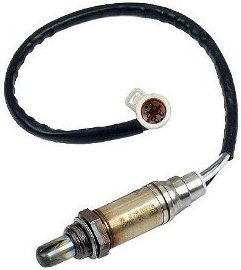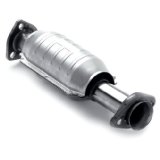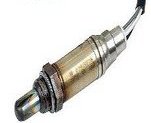Before You Replace the Oxygen Sensor

Before you replace the oxygen sensor on your vehicle let me make an opening statement. In my own personal opinion this is one of the most often replaced sensors. To make matters worse way too often it doesn’t fix the problem with the car or truck.
In most cases this sensor is not a returnable item at your local parts store, because it is considered an electronic component. This is to avoid the try it out before you buy it out driveway warrior. Another problem with replacing the oxygen sensor is deciding which one to replace.
Most vehicles have at least 2 of them installed and four sensor systems are even more common. They’re installed in the exhaust stream to sample the exhaust gas.
A check engine light diagnostic trouble code can be set if the part is bad or if the exhaust gas itself is out of balance from a fuel system problem. So how do you determine which oxygen sensor is bad if any. First let’s learn about what an oxygen sensor does and why.
What does an O2 Sensor do

The signals from the upstream (before the catalytic converter) and the downstream (after the converter) exhaust gas oxygen sensors are used by the electronic control module or the main computer in the vehicle to monitor the current air fuel mixture.
This sensor is a key input signal that will help the vehicle meet or exceed the emissions requirements in the State that it operates in. It will also affect the overall fuel economy of the automobile. This is important to the manufacturers because they are required to meet minimum standards for fuel economy. This is known as c.a.f.e. or corporate average fuel economy. If the car falls below the Government standards it is subject to a gas guzzler tax when purchased new.
The oxygen sensors are threaded into the exhaust pipe near the engine and on some models are threaded into the exhaust manifold. The signal from an oxygen sensor is based on the amount of oxygen contained in the exhaust gases being expelled from the cylinders.
When the sensor signals indicate that this mixture is lean the computer increases the fuel mixture to the engine by increasing the injector on time. When the sensor is reading a rich exhaust mixture the computer would lean the air fuel mixture by reducing the fuel injector on time.
As a rule of thumb if the oxygen level is higher the voltage signal from the oxygen sensor will be low (below 500mv). Likewise if the oxygen level is low the sensors output will be high (above 500mv). This can be important when diagnosing oxygen sensor problems.

Because the oxygen sensor must operate properly quickly from a cold start most late model engines use a heated oxygen sensor. These sensors have an internal heating element that allows the sensor to reach its optimal operating temperature more quickly and maintain its temperature during periods of engine idling.
Now that the oxygen sensor has become so complicated they are capable of setting many different kinds of trouble codes. There are separate codes for heating system malfunctions as well as the response time of the oxygen sensor, overly lean or rich conditions detected, as well as on-board sensor diagnostics such as resistance determined by a reference signal.
With all the possibilities of things that can go wrong with the oxygen sensor it’s self, there are even more possibilities in the surrounding systems that can set trouble codes. This can make the oxygen sensor appear to be the problem. You can save yourself some time and money by following the individual diagnostic chart for the trouble code that is set in the vehicle’s memory.
These diagnostic tree charts take into account that the oxygen sensor may be indicating a symptom and not actually be the problem with the vehicle. You can visit my other site to learn more about web based versions of the car repair manual. For more articles on this website you can visit the homepage for more auto repair information.

